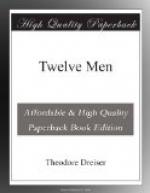He looked up at me in clear-eyed faith. It was remarkable.
“Make them over?” I queried, still curious, for it was all like a romance, and rather fantastic to me. “What do you mean? How do you make them over?”
“Oh, in their attitude, that’s how. You’ve got to change a man and bring him out of self-seeking if you really want to make him good. Most men are so tangled up in their own errors and bad ways, and so worried over their seekings, that unless you can set them to giving it’s no use. They’re always seeking, and they don’t know what they want half the time. Money isn’t the thing. Why, half of them wouldn’t understand how to use it if they had it. Their minds are not bright enough. Their perceptions are not clear enough. All you can do is to make them content with themselves. And that, giving to others will do. I never saw the man or the woman yet who couldn’t be happy if you could make them feel the need of living for others, of doing something for somebody besides themselves. It’s a fact. Selfish people are never happy.”
He rubbed his hands as if he saw the solution of the world’s difficulties very clearly, and I said to him:
“Well, now, you’ve got a man out of the mire, and ‘saved,’ as you call it, and then what? What comes next?”
“Well, then he’s saved,” he replied. “Happiness comes next—content.”
“I know. But must he go to church, or conform to certain rules?”
“No, no, no!” he replied sweetly. “Nothing to do except to be good to others. ’True religion and undefiled before our God and Father is this,’” he quoted, “’to visit the widow and the orphan in their affliction and to keep unspotted from the world. Charity is kind,’ you know. ’Charity vaunteth not itself, is not puffed up, seeketh not its own.’”
“Well,” I said, rather aimlessly, I will admit, for this high faith staggered me. (How high! How high!) “And then what?”
“Well, then the world would come about. It would be so much better. All the misery is in the lack of sympathy one with another. When we get that straightened out we can work in peace. There are lots of things to do, you know.”
Yes, I thought, looking down on the mills and the driving force of self-interest—on greed, lust, love of pleasure, all their fantastic and yet moving dreams.
“I’m an ignorant man myself, and I don’t know all,” he went on, “and I’d like to study. My, but I’d like to look into all things, but I can’t do it now. We can’t stop until this thing is straightened out. Some time, maybe,” and he looked peacefully away.
“By the way,” I said, “whatever became of the man to whom you gave your rubber boots over on Fisher’s Island?”
His face lit up as if it were the most natural thing that I should know about it.
“Say,” he exclaimed, in the most pleased and confidential way, as if we were talking about a mutual friend, “I saw him not long ago. And, do you know, he’s a good man now—really, he is. Sober and hard-working. And, say, would you believe it, he told me that I was the cause of it—just that miserable old pair of rubber boots—what do you think of that?”




